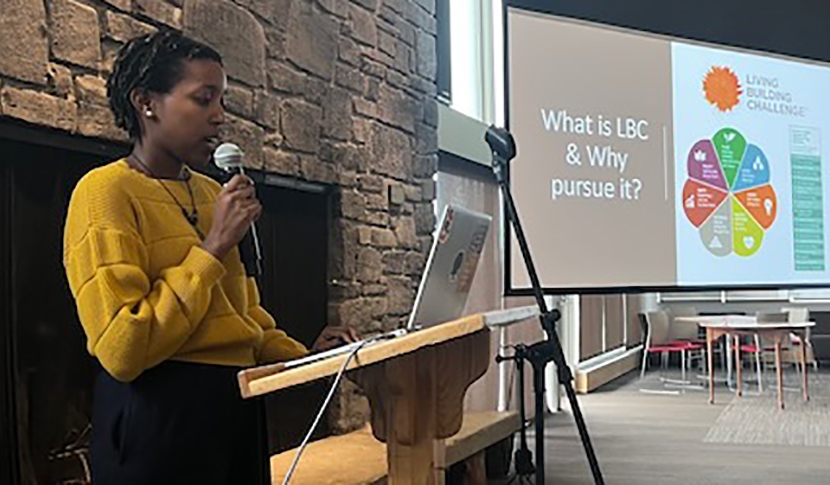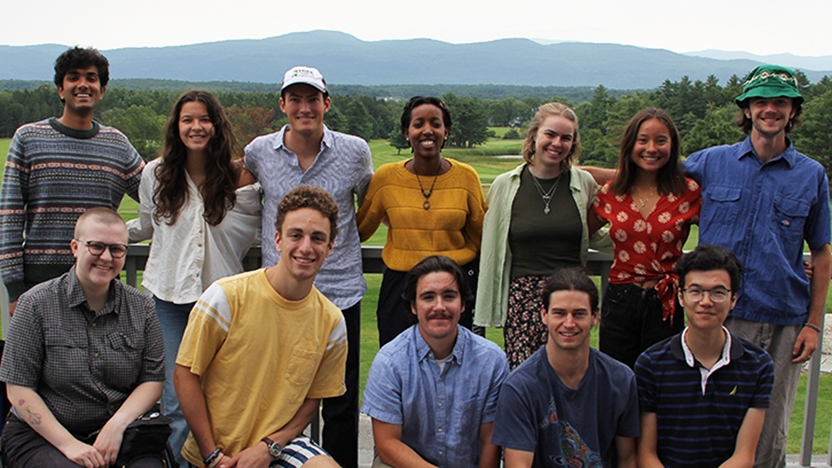Sustainability Solutions Interns Present Research Projects

As a high school student in Los Angeles, Claudia Etrillard ’25 wanted to attend a college in a rural area with a reputation for leading on environmental issues. She also wanted the opportunity to conduct research that resulted in meaningful sustainability solutions.
Middlebury checked all of the boxes. The solutions piece unfolded this summer when Etrillard and 11 other students worked on research-based projects through the Sustainability Solutions Lab (SSL) internship program, which focuses on campus sustainability work. The 2023 cohort worked on nine projects over eight weeks ranging from Etrillard’s creation of signs for the Knoll to food preservation of local produce to filming a documentary about the importance of the Recycling Center.
“Our interns have turned out an inspiring set of ideas and actions that have contributed to a more sustainable campus and community,” said Jack Byrne, dean of environmental affairs and sustainability and director of the Franklin Environmental Center. “They’re showing us all how to be good ancestors. Their inspiring work will be helpful well into the foreseeable future.”
The interns presented their final projects in August at the Kirk Center in front of faculty and staff advisors who guided them through research and implementation phases. Some projects were new while others advanced existing initiatives aimed at helping Middlebury meet its long-term sustainability goals. Past SSL interns have been instrumental in the creation and evolution of Energy2028, greening of athletics, advancing sustainability abroad, sustainable design and construction, sustainable living, and an on-campus student consultancy—127 projects in total since 2017.

The projects are in keeping with the focus of the Sustainability Solutions Lab: to provide students with an experience of professional development while working on sustainability-oriented projects on campus and in the greater Middlebury community.
Charles Deichman-Caswell ’24 created an accessible online tree map using ArcGIS Field Maps so visitors can learn about the trees on campus. This included a tree tour made with Instant Maps.
“I gained valuable experience working with ArcGIS software and Field Maps and learned how to identify and assess over 50 species of trees,” he said.
Angela Izi Nkusi ’24 researched the possibility of pursuing a Core Green Living Buildings Challenge certification for the Homer Harris House, known for its association with master designer and builder Wilbur Mark Perrault. Bolstering previous work by SSL interns, she developed a checklist of the major requirements and a rating for pursuing the coveted certification.
Communications interns Alex Scott-Hanson ’25, Tianyu Chen ‘25 and JT Titmus ’23.5 updated the Franklin Environmental Center website and SSL homepage. They also created social media posts about events, student opportunities, and climate policy information, and produced a video about the importance of the recycling program, the challenges it faces, and how students can support it.
Tara Federoff, cohort advisor and sustainability specialist, said SSL interns play an integral role in advancing climate action at Middlebury. Campus projects that may start small can have ripple effects in the greater Middlebury community and beyond.
“We often talk in our office about the Maya Angelou quote, ‘Do the best you can until you know better. Then when you know better, do better.’ Our SSL interns really help us to do the groundwork in knowing better, so that the institution can do better.”
Interns highlighted the importance of learning how to conduct research with faculty and staff and partnering with local community members.
Annika Vikstrom ’25 teamed with Tim Parsons, the College’s landscape horticulturist; Monica Pryzperhart, laboratory instructor in environmental studies; and Assistant Professor of Biology Gregory Pask to write the procedure for and conduct surveys on breeding birds and Lepidoptera (moths and butterflies) on campus. Interns studied common bird songs and bird identification, conducted black light insect censuses and identified insects that appeared, and created a framework for the future of the project to proceed.
“From my internship, I gained research skills such as drafting and revising documents, navigating online resources, and a mastery of Excel and Google Spreadsheets,” said Arjun Kumar ’25.5, who examined the communications and outreach methods from over 50 climate-adjacent organizations and companies in Vermont.
Heeding the words of climate activist Mary Annaïse Hegler, the SSL endeavors to push past climate action and onto climate commitment, approaching sustainability and climate work with a “what’s next” attitude, so even “final” projects tend to not really be “finished”. With that in mind, Interns included a section at the end of their reports about next steps for advancing their projects. Most planned to continue working in the fall and raising awareness via social media and by recruiting students to support their cause.

